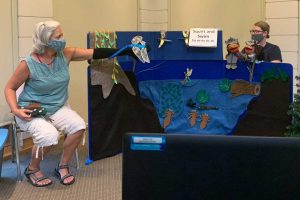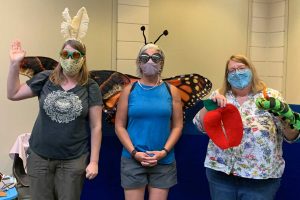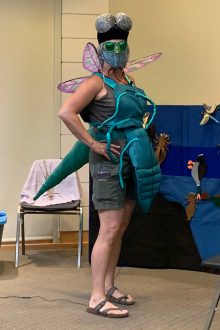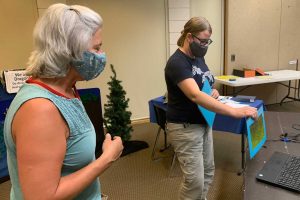As an outreach naturalist for Wehr Nature Center, Holly Walz is no stranger to costumes. Over the years she’s donned wings and performed as a moth and monarch to engage and educate kids about insects. This year, with in-person programming cancelled, she instead found herself dressed as a dragonfly before an audience of one: her laptop. She had to bring the energy herself.
“You turn it up a notch. I suddenly had a southern accent. I was dressed in a dragonfly costume. You make it fun. You’re laughing at yourself while delivering the important information, making the noises that the kids would make if they saw a dragonfly—an ‘ooh’ or an ‘ah.’”
Brooke Gilley, another outreach naturalist with Wehr, agrees. She points to successful science shows for kids, such as Bill Nye the Science Guy or the Wild Kratts. “Even though you don’t have an audience, acting like you’re talking directly to them is key.”
With in-person programming cancelled this spring and summer, Gilley, Walz, and the entire team of outreach naturalists had to shift their environmental education programming from parks across Milwaukee County to virtual platforms like Zoom and YouTube. Mary Gaub spearheaded the transition for schools that had already booked field trips and in-school programs and created additional resources for teachers to enhance students’ learning. Carol Howard made spring birding classes virtual, even doing socially distanced one-on-one birding hikes. Gilley hosted a Virtual Pop-Up Nature event, which included a story, craft, scavenger hunt, and resources for kids and families on a selected topic, like hummingbirds. Walz tapped into her inner dragonfly as part of the Milwaukee Public Library’s summer reading program, “Thar be Dragons,” which was streamed via Facebook Live.

Photo credit: Wehr Nature Center.
While virtual programming has opened up opportunities to reach new audiences outside of southeastern Wisconsin, it also takes time to prepare and execute—more time than in-person programming. Much of this work is also done inside. Gilley now edits and captions videos in lieu of leading kids on hikes through Milwaukee County parks. “As much as we are creating amazing content, it is a challenge not to be outside.”
Bringing Wehr to School
Not only are the naturalists spending less time outside, but so are the students Wehr serves, many of whom are beginning their school year virtually at home rather than in the classroom. Educators noted it’s difficult for students to stay engaged. Wehr plans to offer schools a mix of pre-recorded and live programming that will provide students a new face on their screen. “It gives the kids someone else to listen to and a different perspective throughout their day of sitting,” Walz says.
Gilley adds that the programming will be focused on a topic, like insects, and that the live component will allow students to ask naturalists questions about the pre-recorded material. “It will be nice to have the live sessions with the students so we can have that interactive facetime.”
Wehr also has resources for families on their website, including printable scavenger hunts, nature journals, and crafts. Virtual programs like Pop-Up Nature will continue throughout the fall with seasonally relevant topics.
Families can also purchase Get Outside (GO) Nature Activity Bags in the online store, which contribute toward Wehr’s Adventure Challenge fundraiser. Each string bag is filled with materials such as hand lenses, stickers, and booklets to encourage kids to explore outside. Kids can choose between three differently themed bags: Insect Detective, Leaves ‘n Trees, and Autumn Apples.
Exploring Together
With an abundance of screen time, it remains important for families to get outside. Parents and caregivers, however, may feel insecure about not knowing the birds, flowers, or plants they’re observing. Gilley frames these moments as opportunities to grow together. “If you have children that are fairly young, they’re not going to know what that thing is, so you can learn together and that’s what makes it fun.” She recommends Golden Guides as easy-to-use resources to help kids identify what they find outside.

Slow down. Unplug. Observe the world through children’s eyes. In a year marked, for some, by dreary routine, adopting a fresh perspective may be welcome.
Walz adds, “That’s the greatest thing about nature, you’re always discovering new things. That sense of awe, that sense of wonder.”
For further information on upcoming virtual events, check out Wehr Nature Center’s calendar.



